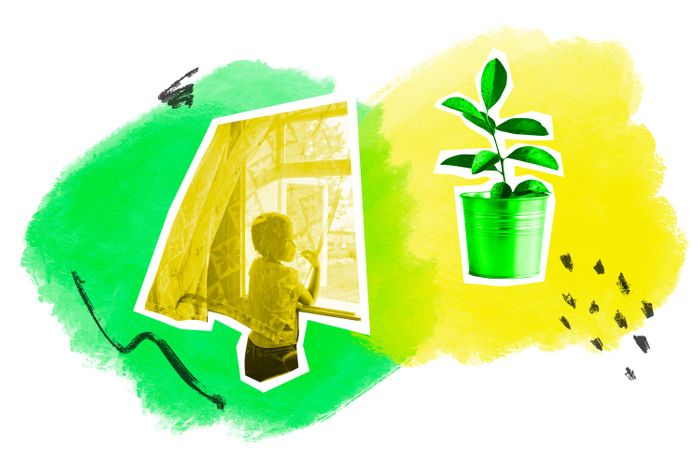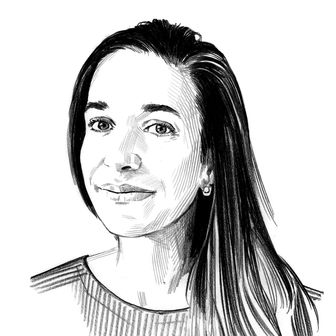
Many vivid analogies might attempt to describe what deep-pandemic family life was like. Sous-vide cooking, where we’re all contained within a vacuum-sealed pouch submerged in boiling water. An overheating greenhouse, where the plants are starting to yellow and die. A panoptic prison, where the guards are the kids. The physiological and sensory condition of an ingrown toenail. In other words, the family unit, at this point in history, is in desperate need of oxygenation. Air that shit out.
For me, this means passing my kids and their friends back and forth among houses. My family has been relatively lucky in how the pandemic has impacted us, but I mourn the passing of two prime years during which other adults could have been hanging out with my kids. And I, likewise, have missed two prime years of looking after my friends’ kids. It’s time to let some new freaks in, let them tell the kids to pick their socks up off the floor. Is it COVID safe? That’s for you to judge. If your kids are under five, this advice might not land for you. For those of us with kids who are vaccinated, like me, the need is urgent.
I was never meant to be the boss of a household, and I resent the disaster-capitalist reification of boss-parenthood that has become parents’ strategy for coping with zero paid leave and zero subsidized child care. I believe other people have the ability to make my kids cooler and happier than they will be if left solely in my care. This isn’t because I “suck” or whatever — I am confident in my ability to raise my children, don’t worry about me. But I know that family life was never meant to be so self-contained.
Dr. William M. Bukowski, a professor of psychology at Concordia University in Montreal (where I also study), confirmed my suspicion that a rush of new social air can have real benefits for kids: “Children can use these opportunities to make a comparison point — to see the strengths and the weaknesses of their own families. They might have their own values reinforced, or there might be opportunities to see how things are done elsewhere, which might form the basis for discussion in their own homes about how something could be different … And it can add to a person’s appreciation for diversity. Not only in terms of how other people do things, but how other people say things: What kind of lingo goes on over there?”
I was a very worried kid. On car rides, I would keep a sharp eye on the gas gauge, and once it hit a quarter-tank, I would begin pleading with whichever parent was driving to gas up before we became stranded. Once, on the school bus, the driver threatened to drive us to Toronto if we didn’t pipe down. (This was a very pointed threat in early-’90s Quebec. It seemed unspeakably awful. It still does, in fact!) For years thereafter, I was terrified of the bus driver taking us off course or getting lost, so I tried to sit in the front, where I could remain on hand for directions should they be needed. I refused to chat with other children on the bus so that I could focus on the route.
On top of being a worrywart, I was hyperobservant and sensitive — exactly the kind of kid that contemporary “gentle parenting” techniques are intended to honor and nurture. I didn’t love most other people’s houses because often they didn’t smell right to me or the parents seemed shifty in ways I couldn’t quite explain. The minor key of the French cleanup song we sang in kindergarten made me cry daily for months. As I’ve written about before, I felt alienated by the duck décor that was ubiquitous in my friends’ parents’ houses during the ’90s.
People who knew me as a kid notice that I’m not really like that anymore. I still worry, probably an average amount, but I keep it where it belongs: bottled up inside. I can’t say for absolute certain, but I’m pretty sure the way I overcame my childhood anxiety was by being surrounded by people who simply were not interested in hearing about it. It’s not that they didn’t “see me” or “honor me.” I was raised partly on a commune full of very loving people who know me as well as anyone. But since most of them were not my parents, they didn’t feel an obligation to listen to my every concern. Over time, I guess I realized I was being annoying, which is not the same as being shamed or silenced. In many cases, I was being annoying. Prolonged contact with the rough edges of other people sanded down some of my own rough edges. Some people might disagree, but I think this is good! Humans are social, and belonging to the group is a survival imperative.
This goes against the tenets of most popular contemporary parenting styles, like RIE and gentle parenting. In her recent critical appraisal of these philosophies, Jessica Winter writes, “The gently parented child, the theory goes, learns to recognize and control her emotions because a caregiver is consistently affirming those emotions as real and important.”
But also: A child cared for by people other than their parents might learn to control their emotions because a caregiver is consistently affirming that they belong to a real and important community with certain norms and expectations.
Does it make you sad to think of a child self-censoring their worries? Maybe it shouldn’t. The gentle-parenting movement would seem to argue that children are so intelligent, so intuitive, that to diminish them in any way would be unfair. But what if their intelligence can be encouraged in other ways, such as observing their communities buzzing around them and having to figure out, by trial and error, how to find their place within them? Climate disasters and workplace exploitation honor no one’s individuality. Our kids will need the support of their communities to agitate for system change. Raising them as the emotional navels of their households is not likely to prepare them for that work.
Rather than dwell on the grim future and its tax on their reservoirs of resilience, though, I’d rather count the joys of the present. It’s been nice having the kids spend time with other people these past couple of months. Our old friend Susie takes them on long walks around the neighborhood that often include an extended stop at a dry cleaners to visit her friend who works as a presser. Another mom that cares for them always tunes in to “the Beat 92.5 — Montreal’s perfect mix” in the car, and my older son has at long last persuaded me to start doing the same. At first, I resisted — in this house, we listen to NPR — but now I know all the stupid songs and my brain has accepted that this is our life. What else? My kids ate so much candy at a sleepover the other week that they declared themselves temporarily maxxed out when they came home. Not being present to exert my predictable will over everything they do is a relief to us all.
Bourgeois parenting can be a prison for adults and children alike, so in the spirit of prying loose the bars, I tell my well-intentioned friends: Please don’t worry about my kids’ likes and dislikes. Part of the point of other people looking after them is to relinquish some control and teach them to adapt to other people’s ways of doing things. Do not ask my kids what flavor of ice cream they like. Just give them what you have, man! They are lucky to be served ice cream at all. If they don’t like it, they can politely decline. And if they just say “no,” please prompt them with a “no, thank you.”
Adults’ behavior can be nudged toward a less obnoxious paradigm, too. Just as nonrelative friends can help kids learn social intelligence, nonrelative kids can help parents learn self-control. One of the reasons I like having my kids’ friends over is that it forces me to keep my grumpiness in check and sometimes sheds disinfectant light on my lesser habits. I don’t want the neighbor kids going home to their parents with stories about the mindless, robotic way I snap at my sons about cleaning up after themselves.
During the loneliness of the pandemic, I often fantasized about “community.” Community as an imagined abstraction is pabulum made of our own hopes and ideas, but anyone who has ever volunteered for anything knows that belonging to an actual community is a mess. Community is full of other people’s bad ideas and awkward behavior. It’s hard work, and it’s not perfectly safe. People say and do hurtful things in a community, often without meaning to. But any sociologist working today will assure you that community is much safer than isolation.
I can feel the pendulum swinging back from the intensive, highly attuned parenting model exemplified by gentle parenting. These methods might have had a few years of influence left, but the pandemic seems to have ground a lot of that goodwill into dust. Maybe we are all waking up from a decades-long slumber during which we dreamed about living in self-reliant nuclear families. New data shows that multigenerational living is replacing nuclear-family living as the norm out of economic necessity. Perhaps popular parenting styles will catch up to the material conditions of our lives and center the community as much as the child.





